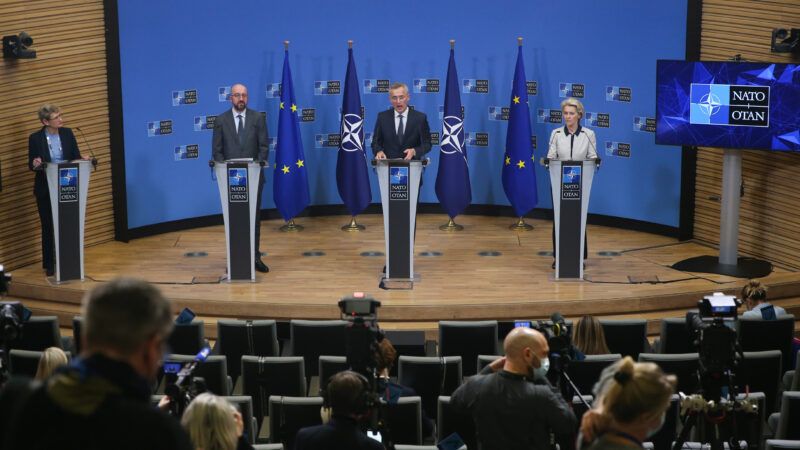NATO Was Never Actually Willing To Defend Ukraine. Pretending Otherwise Was Dangerous.
Closing the door to Ukrainian membership in NATO would have allayed Russian security concerns and maybe preserved the peace.

An explicit promise from the U.S. that Ukraine would never be allowed to join NATO might not have prevented the Russian attack of that country. The American reaction to the outbreak of war suggests there wouldn't have been any downside to forswearing that option anyway.
The invasion has provoked swift and strong condemnation from President Joe Biden and other European allies. But other than promising more sanctions, no one in a position of power is suggesting direct military intervention to support Ukraine in its war with Russia.
"We have made it clear that we don't have any plans and intention of deploying NATO troops to Ukraine," said NATO Secretary-General Jens Stoltenberg earlier today, per Reuters. Biden likewise said at a press conference today that while he was deploying more U.S. troops to the region, they "are not going to Europe to fight in Ukraine."
This aversion to getting into a shooting war with Russia over Ukraine is widely shared across the domestic political spectrum in the U.S.
Democratic leaders in Congress have deployed a lot of heated rhetoric, but they also haven't floated anything stiffer than sanctions on Russia. On the right, even normally eager interventionists like Sen. Marco Rubio (R–Fla.) have waved away the idea of sending troops to Ukraine.
And earlier this week, a bipartisan group of 43 House members—ranging from socialist Rep. Alexandria Ocasio-Cortez (D–N.Y.) to libertarian Rep. Thomas Massie (R–Ky.)—sent Biden a letter reminding him that any deployment of troops to Ukraine would have to be approved by Congress first.
This noninterventionist attitude is shared by the public too. Polls consistently show that only about a quarter of Americans either support war with Russia over Ukraine or want the U.S. to play a major role in the conflict.
All of this is to say that, even in the face of explicit Russian aggression, the vast majority of the American public and public policymakers have no interest in expending blood and treasure defending the faraway nation of Ukraine.
Despite that unwillingness to defend Ukraine, the U.S. has continually expressed openness to the country eventually joining NATO—an arrangement that would commit us and the rest of the 30-nation alliance to defending it from attack.
As recently as October, U.S. Defense Secretary Lloyd Austin was in Kyiv saying that Ukraine had a right to decide for itself if it wanted to join NATO and that "no third country" (i.e. Russia) had a veto over NATO membership decisions.
Given America's widespread apathy to actually defending Ukraine—a country that has little bearing on our security or economic well-being—it seems disingenuous to continually raise Ukrainians' own hopes that they might be accepted into the alliance.
Worse still, leaving open the possibility of Ukrainian membership in NATO has exacerbated the security concerns of Russian President Vladimir Putin.
"A big part of this is about Russian security fears," said William Ruger, president of the American Institute for Economic Research (AIER) and President Donald Trump's nominee for ambassador to Afghanistan, on a recent podcast. "The Russians would basically have the same fear [of Ukrainian NATO membership] that we would have if China wanted to conclude an alliance with Mexico, and Mexico was a willing partner. We wouldn't stand for that."
Putin has now invaded Ukraine with the aim of forever preventing another NATO member from popping up on its border. That doesn't make the Russian invasion justified, but it is an understandable exercise of power politics.
Had the U.S. definitely closed the door on Ukrainian NATO membership, that would have alleviated some of Putin's security concerns. Perhaps that would have been enough to prevent a Russian invasion of the country. Perhaps the war would have happened anyway.
At a minimum, it would have more clearly signaled the now-obvious fact that neither the U.S. nor other members of NATO are willing to actually go to war to defend Ukraine. Even if the chances of that gesture preserving the peace are small, there wouldn't have been any cost to doing it.
